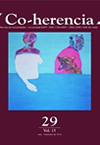On the relationships between philosophy and literary theory
Main Article Content
Keywords
Literary theory, philosophy, Poetics, programmatic texts, romanticism.
Abstract
This paper addresses the potential of philosophy to renew the critical assumptions of literary theory by examining two key aspects. On the one hand, it challenges the belief that the identification of philosophy with literature, promoted by deconstruction, implies the exclusion of other forms of relationship between their respective fields of expertise. On the other hand, it proposes a way to make philosophy productive for theory which involves not so much the expansion of the textual referents already established by Poetics but rather the full exploration of its original contexts. Instead of promoting speculation around new philosophical references, what is at issue here is to restitute these references to their original textual environments in order to derive new implications from ancient theoretical formulations.
Downloads
References
Asensi, M. (1995). Literatura y filosofía. Madrid: Síntesis.
Blanchot, M. (1992). El espacio literario. Barcelona: Paidós.
Bouchard, G. (1976). Literature et Philosophie. Études littéraires, 9(3), 436 -468. doi: https://doi.org/10.7202/500415ar
Cavell, S. (2002). En busca de lo ordinario. Líneas del escepticismo y romanticismo. Madrid: Cátedra.
Culler, J. (2002). La literaturidad. En M. Angenot, J. Bessière, D. Fokkema y E. Kushner, (Eds), Teoría literaria (pp.36-50). México: Siglo XXI.
Danto, A. C. (2010). Philosophy and/as/of Literature. EnG. L. Hagberg & W. Jost (Eds.), A Companion to the Philosophy of Literature (pp. 52-67). Chichester: Wiley-Blackwell.
De Man, P. (1998). La ideología estética. Madrid: Cátedra.
Derrida, J. (1987). La escritura y la diferencia. Barcelona: Anthropos.
Duhamel, R. (1995). Literatur und Philosophie. Von Grenzfällen und gefallenen Grenzen. Zeitschrift für Literaturwissenschaft und Linguistik, 25(1), 114-122. doi: https://doi.org/10.1007/BF03396142
Eagleton, T. (2005). Después de la teoría. Barcelona: Debate.
Garrido Gallardo, M. A. (2001). Nueva introducción a la teoría de la literatura. Madrid: Síntesis.
Garrido Gallardo, M. A. (2014). Cervantes y la preceptiva literaria. Anales Cervantinos, 46, 179-202. doi: https://doi.org/10.3989/a nacer va ntinos.2014.011
Garrido Miñambres, G. (2010). República poética. Textos programáticos de la literatura española (SS. XVIII-XIX). Madrid: Dykinson.
Garrido Miñambres, G. (2014). Entre el organismo y el artefacto. Sobre la conformidad a fin narrativa, Endoxa, 34, 67-86. Disponible en https://bit.ly/2JIcrjU
Havelock, E. A. (1994). Prefacio a Platón. Madrid: Visor.
Hagberg, G., & Jost, W. (2010). A companion to the philosophy of literature. Chichester: Wiley-Blackwell.
Kitcher, P. (2013). Deaths in Venice. The Cases of Gustav von Aschenbach. New York: Columbia University Press.
Lacoue-Labarthe, P. y Nancy, J.-L. (2012). El absoluto literario. Teoría de la literatura del romanticismo alemán. Buenos Aires: Eterna Cadencia.
Lamarque, P. (2009). The Philosophie of Literature.Carlton:Blackwell.
Leitch, Vincent B. (Ed.). (2001). The Norton anthology of theory and criticism. New York: Norton & Company.
Norris, C. (1991). Spinoza and the origins of modern Critical Theory. Cambridge: Basil Blackwell.
Norris, C. (2007). Fiction, Philosophy and Literary Theory. Will the Real Saul Kripke Please Stand Up? London: Continuum.
Nussbaum, M. C. (2005). El conocimiento del amor. Ensayos sobre filosofía y literature. Madrid: Machado.
Nussbaum, M. C. (2010). Perceptive Equilibrium: Literary Theory and Ethycal Theory. In G. L Hagberg & W. Jost (Eds.), A Companion to the Philosophy of Literature (pp. 241-267). Malden: Wiley Blackwell.
Orsi, R. (2007). El saber y el error. Filosofía y tragedia en Sófocles. Madrid: Plaza y Valdés.
Pardo, J. L. (2002). Más Prozac y menos Platón. Archipiélago, 50, 11-19.
Sauerland, K. (1993). Paradigmawechsel unter dem Zeichen der Philosophie. In C. König y E. Lämmert (Eds), Literaturwissenschaft und Geistesgeschichte 1910 bis 1925 (pp. 255-264). Frankfurt am Main: Fischer.
Soares, L. (2003). Esbozo de una discrepancia. Platón y la poesía tradicional. Kléos. Revista de filosofía, 7- 8, 71-93.
Szondi, P. (1992). Estudios sobre Hölderlin. Con un ensayo sobre el conocimiento literario. Barcelona: Destino.
Thiebaut, C. (1995). Filosofía y literatura: de la retórica a la poética. Isegoría. Filosofía y literatura, 11, 81-107. Recuperado de https://bit.ly/2IwKxla
Till, D. (2013). Rhetorik und Poetik. In T. Amz (Ed.), Handbuch Literaturwissenschaft (Vol. 1, pp. 435-465). Stuttgart: Metzler.
Watts, S. (2014). ¿Puede hablarse de poesía filosófica en Platón? Eidos, 20, 75-94. Recuperado de https://bit.ly/2tg1Z89
Williams, B. (2011). Vergüenza y necesidad. Recuperación de algunos conceptos morales de la Grecia antigua. Madrid: La Balsa de la Medusa.
Zima, P. V. (1995). Literarische Ästhetik, Methoden und Modelle der Literaturwissenschaft. Tübingen: Fink.




